
An API product (or “API resource”) is a virtual product protected by an API Key. It could represent software, services, or digital goods. All API products are virtual—sold like downloads, but accessed via API authentication.
API products can be:
- Simple or Variable products
- Simple or Variable Subscriptions (via Woo Subscriptions or Constellation)
- Grouped products (only the children can be API-enabled)
⚠️ External/Affiliate products cannot be used as API products.
To make a product API-enabled:
- Edit the product
- Check the “Licensing” box
- Save the product
Once API is enabled:
- Product Order API Keys are auto-created for all past orders.
- The product can’t be deleted.

Download Handling Options
↑ Back to topIf your product is Downloadable, you can:
- Upload a .zip file (required for WP plugins/themes)
- Use an Amazon S3 URL (requires extra setup)
- Use a remote file URL
Downloads are:
- Limited to 1 active file (new uploads replace the old one)
- Secure
- Expire after 60 minutes
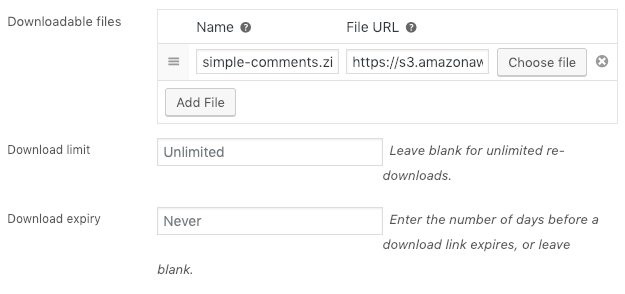
WooCommerce Product Types & Licensing
↑ Back to topYou can sell API products using any WooCommerce structure:
- Simple / Simple Subscription: One version, one price
- Variable / Variable Subscription: Multiple activation tiers (e.g. 1, 5, 25)
- Grouped Products: Bundle multiple API-enabled products
Each variation or simple product can have its own Activation Limit.
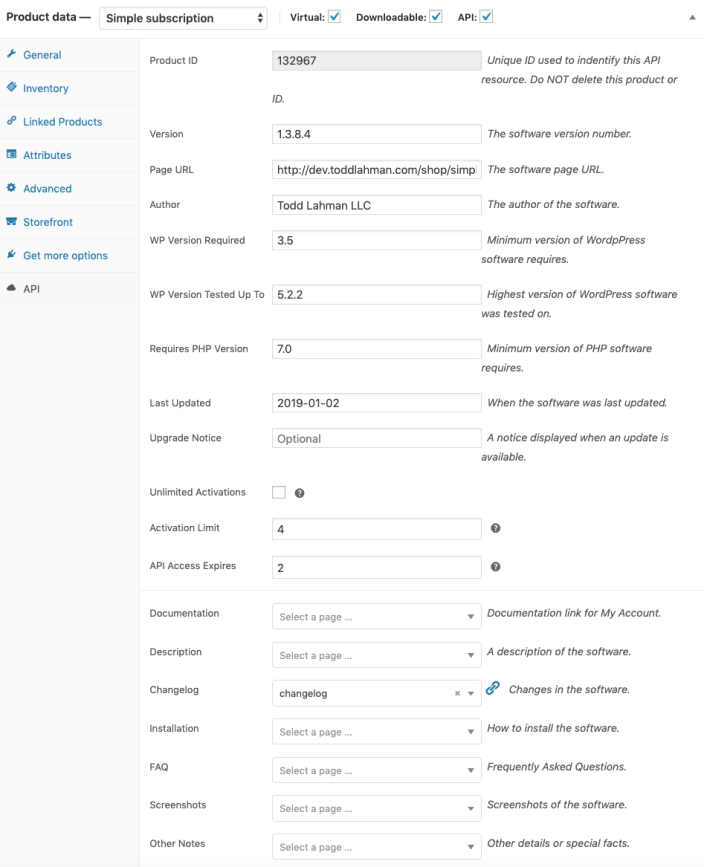
Activation Settings
↑ Back to topUnlimited Activations
Replaces the activation limit field. Uses a default of 100,000 but can be changed via filter. Safe for high-volume licenses.
Activation Limit
Controls how many devices or sites can use a license.
- Leaving blank sets a default activation value of 1
- Any number of activations can be set
API Access Expires
Used for one-time purchases (not Subscriptions).
- Not available for Subscription products (time limits handled by the subscription)
- Set a time limit in days (e.g. 365 for one year)
- After expiry, customer must repurchase
- No auto-renewals or email reminders

Variable Products: How It Works
↑ Back to topIf using Variable or Variable Subscription:
- API settings on the parent apply to all variations (unless overridden)
- Each variation can have a different Activation Limit
- Use attributes to create a selection dropdown (e.g. choose between 1, 5, 25 activations)
To override parent settings, check: “Set API options for this variable product only.”
Free API Products
↑ Back to topYou can offer free licenses:
- Set product price to $0
- Assign to customer via free order
- User still needs an account (login is required for all API access)
API Manager product values
↑ Back to topProduct ID
↑ Back to topThe unique WooCommerce product ID. Required for client access. Cannot be changed.
Unlimited Activations
↑ Back to topSets activation limit to 100,000 (filterable). Hides the regular Activation Limit field.
Updates apply when a user accesses their account to reduce load.
Activation Limit
↑ Back to topSets how many activations a license allows.
- Leave blank = 1 activation
- Use a high value (e.g. 1000) for large-scale use
- Don’t leave blank if “unlimited” is intended
- Increasing the limit updates existing keys; decreasing it does not
If the Activation Limit is increased after the product has been purchased, all API resources for this product will have the Activation Limit raised to the new value. The API resources for this product will not have the Activation Limit lowered if it is decreased.
The remaining fields are primarily intended for licensing WordPress plugins and themes, including compatibility, versioning, and update metadata. While designed with WordPress in mind, these fields can also support any client software.Version
↑ Back to topThe currently available software version in the store.
Author
↑ Back to topName of the software author.
Page URL
↑ Back to topLink to the plugin/theme homepage or version details.
WP Version Required
↑ Back to topMinimum WordPress version required.
WP Version Tested Up To
↑ Back to topLatest version tested against.
Last Updated
↑ Back to topDate of the last update.
Upgrade Notice
↑ Back to topShown when an update is available.
Variable products and subscriptions
↑ Back to topVariable products are ideal for selling WordPress plugins, themes, or SaaS tools with multiple license tiers in WooCommerce. Using the API Manager, you can offer flexible license plans, like single site, 5-site, or unlimited, under a single product listing.

The Licensing tab for variable products works slightly differently:
- Activation Limit is set per variation, not on the parent product.
- You can use either the parent product ID or the individual variation ID in your client software: they both work for API license lookups.
- Licensing details from the parent product (version info, changelog, etc.) are auto-copied to each variation by default.
This is the best setup if you’re licensing digital products with multiple pricing or activation tiers.

Variable Product Variations
Each variation can have a unique API Key Activation Limit, making it easy to offer license options like 1, 5, or 25 site activations.
Want to customize license info for one variation? Check “Set API options for this variable product only.” This allows you to override version info, changelogs, and more. Useful when you need precise control over your WooCommerce license plugin setup.
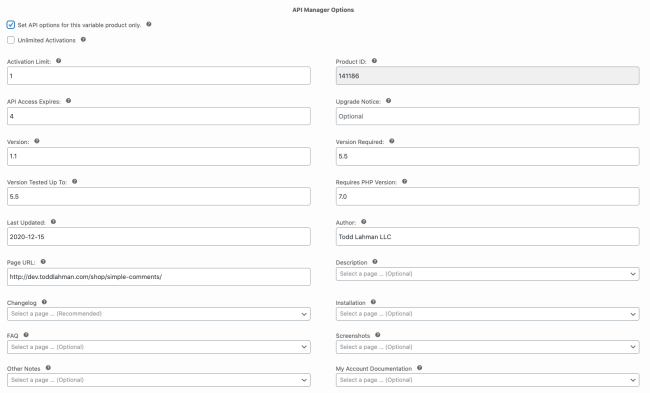
It is possible to set unique values in the variation form fields by checking the “Set API options for this variable product only.” checkbox. If all the product details, other than the number of API Key activations should be the same, don’t check the “Set API options for this variable product only.” checkbox. Below is what the form looks like when setting unique values for a variation, which has already been populated by the parent API tab form field values initially.
Attributes
To display license choices on the frontend, add a custom product attribute like “License Type” or “Activation Limit.”
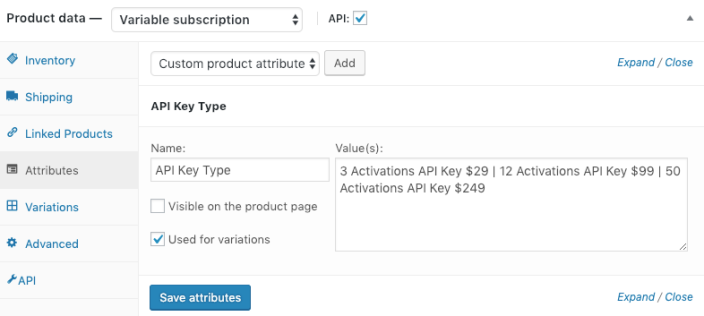
Set this attribute for each variation, then configure a Default Form Value under the Variations tab.
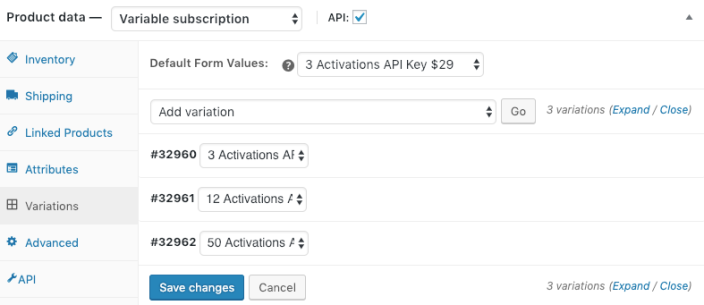
On the storefront, your shoppers will see a dropdown to select their license, making it easy to sell WordPress plugins with clean, conversion-friendly UX.
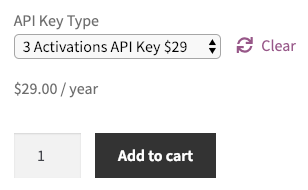
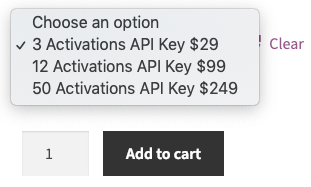
Wrapping Up
↑ Back to topThe API Manager makes it easy to sell and manage software licenses, whether you’re using simple products, subscriptions, or complex variable products with multiple tiers. If you’re moving from another solution, be sure to check our migration solutions for WooCommerce Software Add-on, Freemius, or Easy Digital Downloads.
Need more help?
- Or contact our support team, we’re here when you need us.
- Read the full documentation or check out our additional guidance on using Subscriptions alongside the Kestrel API Manager
- Visit the sales page to get API Manager
